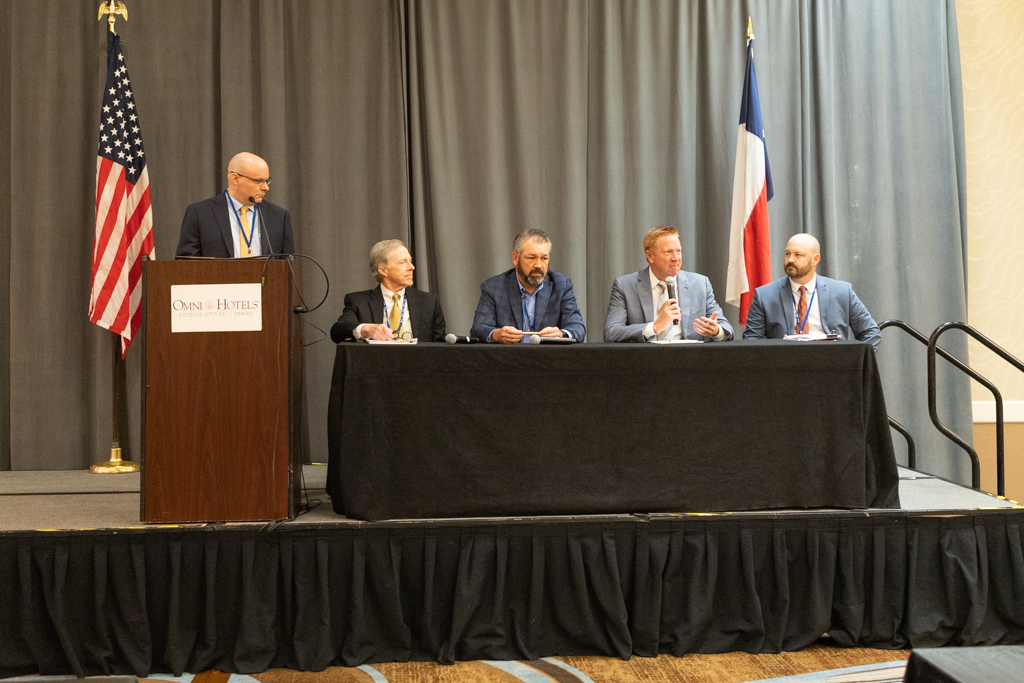A panel of four actuaries who work with pension funds across Texas and the U.S. shared their insights and experiences on various topics, such as city participation, intensive reviews, and benchmarking, at the Texas Local Fire Fighters Retirement Act (TLFFRA) Education Foundation Conference on Oct. 3, 2023. The panel was moderated by David Fee, the staff actuary for the Texas Pension Review Board (PRB). Getting municipalities to increase their participation was the hot topic of the panel.
Photo: The Actuarial Panel on Oct. 3, 2023, at the TLFFRA Conference, from left are David Fee, staff actuary of the Pension Review Board; Mark Fenlaw, with Rudd and Wisdom; David Sawyer, Definiti; Brad Heinrichs, Foster and Foster; and Thomas Bevins, Gabriel Roeder Smith & Company.
In response to Fee's question about encouraging city participation in pension fund operations, Definiti actuary David Sawyer replied, "Well, that's the million-dollar question." The room's audience of firefighter pension system representatives erupted in laughter.
"It's always good when city representatives show up [to meetings] but the cities have different views about their relationships with the plans," Sawyer said.
Mark Fenlaw, with Rudd and Wisdom, also answered Fee, saying, "It is different from city to city."
"Sometimes it is the chairman that will talk to the mayor or city manager to educate them about a challenge, and sometimes that is very effective," he said. "We try to identify challenges in our reports for the pension fund to give to the mayor or manager."
Brad Heinrichs, an actuary with Foster and Foster, said that the Pension Review Board's intensive reviews often succeed in getting city representatives to attend and learn about pension fund challenges. Heinrichs noted that cities with variable contribution rates pay more attention because they know the required contributions might heavily impact the city budget.
A Loaded Question
Fee also asked a loaded question about the Pension Review Board's intensive actuarial reviews, asking the panelists for their views on the pros and cons of the process.
Sawyer said the city representatives pay attention to intensive reviews, and he feels they get more done afterward. But, he said, the con is that people prefer to avoid visiting Austin to be in front of the Pension Review Board members.
Heinrichs said that some board members feel the intensive review can be a "public shaming" where they will be embarrassed.
"In reality," Heinrichs said, "they are probably doing a great job," given their constraints. He noted that pension funds' steady lowering of their target rates is a conservative and wise strategy. But, he said, they affect the amortization period and funding ratio.
"The intensive reviews fail to calculate what has gone on in the details of the plan," Heinrichs said. "It hurts the [pension] board, and it hurts the membership."
He hoped the Pension Review Board could have more private conversations with city sponsors to get them in sync with pension fund problems. Fee reminded the audience of the state agency's public meeting requirements. The Texas Open Meetings Act requires the Pension Review Board, as an agency of the State, to take notice of their meetings for public, open discussion of matters at hand.
Heinrichs then offered a suggestion based on his firm's work with a thousand police and firefighter pension funds around the U.S. He said that Texas firefighter funds require members to pay the highest contribution rates in the country.
"The Pension Review Board could be helpful by benchmarking systems to other programs around the country," he said. "It's the cities that need to contribute more."
PRB Power
Fee then was asked whether the Pension Review Board is "happy" with the amount of power it has. Fee responded that the PRB, in its current form, could help pension funds, including encouraging cities to contribute more. He described a recent situation where a phone call to leaders in one city moved them to increase funding and improve their pension fund's health quickly.
Sawyer said that the state recognizes that increasing their control of local pension funds might require them to contribute funding, and they don't want to do that. Fenlaw responded by saying the Pension Review Board is doing what the state requires, highlighting areas that need improvement.
TLFFRA
The TLFFRA Education Foundation was formed for the purpose of educating firefighter pension board members. The non-profit foundation provides educational opportunities, including annual statewide conferences, regional workshops, lectures, and other events the board deems appropriate. The TLFFRA Education Foundations recognizes that serving on a pension board is often a secondary, voluntary duty for the individuals involved. It operates on the assumption that the health of pension funds requires educating board members about fiduciary responsibility, board management, and sound investment practices.
About the Author:Joe Gimenez is a public relations professional who specializes in pension fund communications. He has assisted TEXPERS and several Texas pension funds in crisis situations and public affairs.

